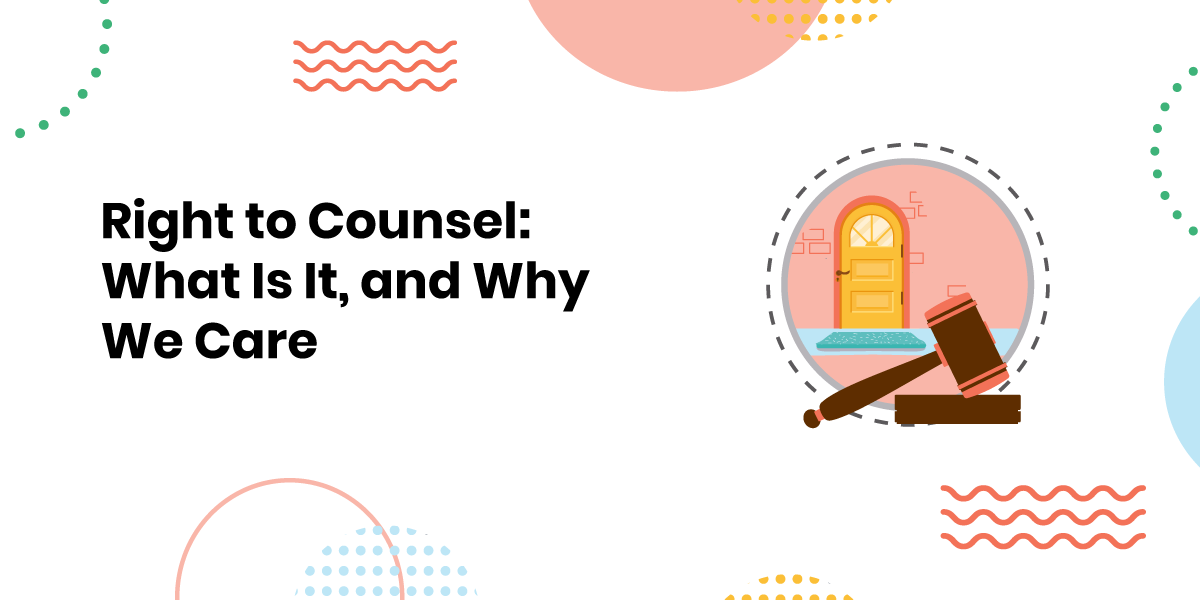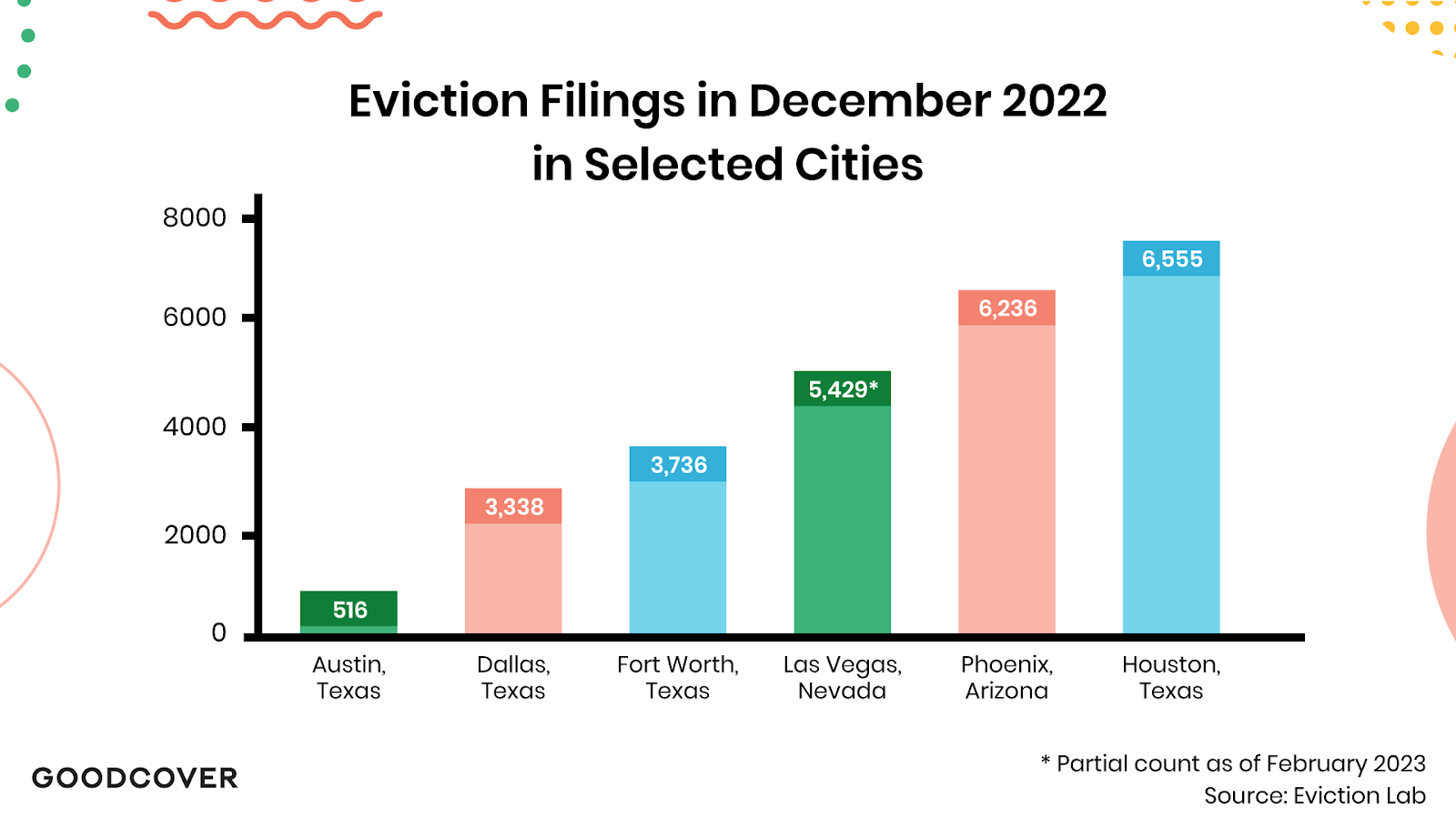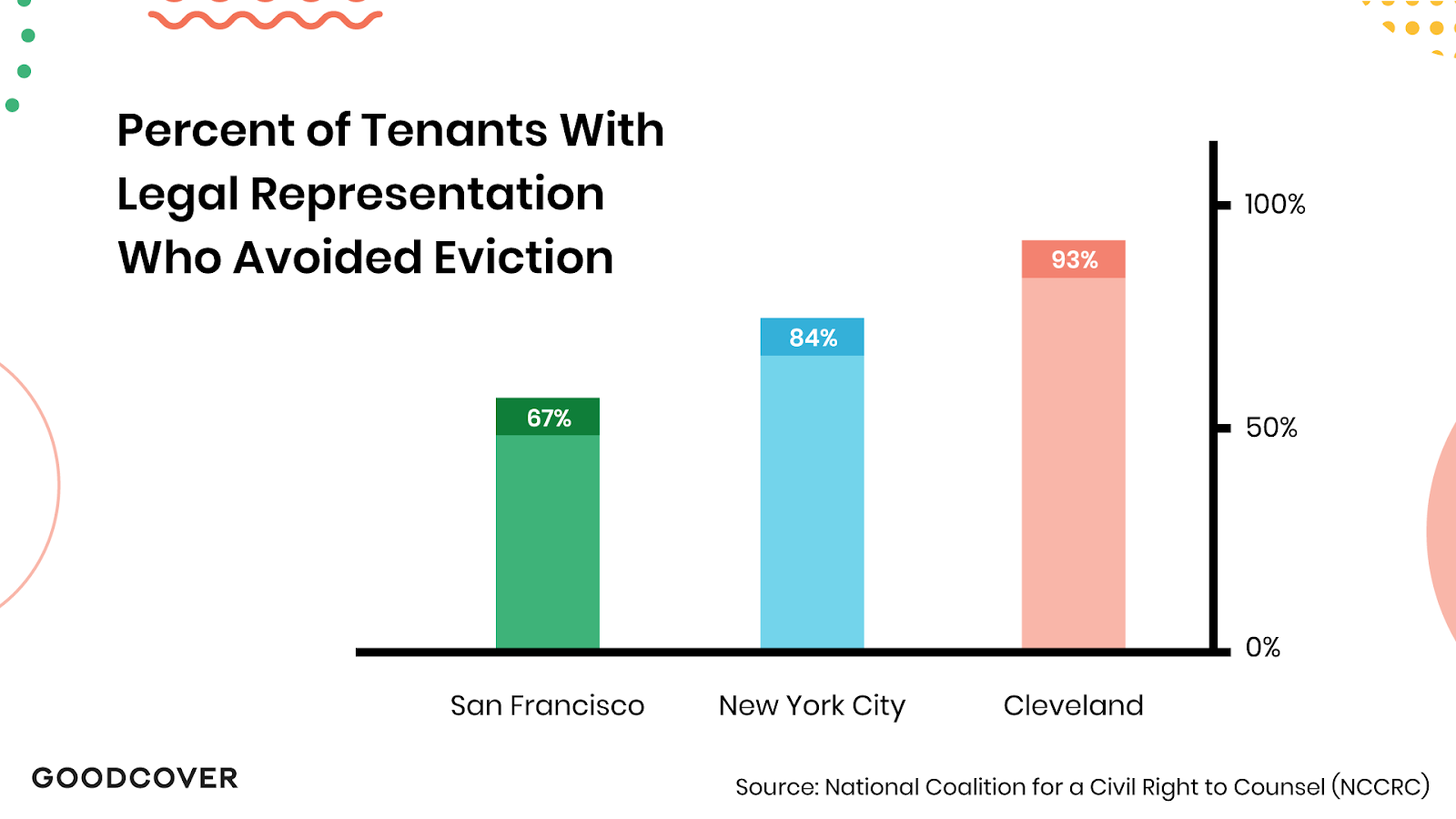Tenant Right to Counsel: What Is It, and Why We Care
12 May 2023 • 6 min read

Eviction.
It's a word that scares tenants everywhere. Imagine being called to court to defend yourself against a landlord who wants to evict you. In that room full of people in suits, you sit alone at a table, not knowing the rules of the game.
What if there was a way to even the playing field a bit and ensure a fair fight in the courtroom?
The right to counsel, or the right to representation for tenants facing eviction court, has been making waves in recent news.
Cities like Philadelphia, Newark, San Francisco, and Cleveland have already spearheaded this right. So far, it's also spread to 11 more cities and three states. But as more cities work to join this movement, the lack of federal law to support it makes it an uphill task.
Recently, the Biden Administration released guidelines for a new era of tenant protections: the Blueprint to a Renters Bill of Rights. Yet, despite calling for a right to counsel on its 16th page, it stopped short of calling for a federal right to counsel for tenants.
For tenants facing eviction in court, that means paying for attorneys out of pocket.
Lack of legal aid creates an uneven playing field where the tenant can lose everything because they lack legal representation. In this piece, we’ll explain the right to counsel in eviction court, how it works, its benefits, and why every renter (affected or not) should care.
- The Right to Counsel for Tenants
- Why Renters Should Have the Right to Counsel
- Why Every Renter Benefits From the Right-to-Counsel Program
- At Goodcover, We Support the Right To Counsel for Tenants
The Right to Counsel for Tenants
A right-to-counsel program for tenants ensures that eligible renters facing eviction proceedings in court have access to free legal representation. This right is much like when the state provides a public defender to an eligible defendant during a criminal case.
In most cities, you aren’t entitled to legal counsel if you’re taken to eviction court. You’d be expected to pay for your own lawyer. But with a right to counsel you’ll have an advocate on your side to help navigate the complex legal process and fight for your rights as a tenant in your eviction case. This can save you from being forced to move.
Having a lawyer for your landlord-tenant disputes can also mean access to other valuable help. Programs like rent assistance, eviction moratoriums, and other benefits aren’t often well-known by renters without legal representation.
State-funded legal services organizations can help you navigate a complex legal process and negotiate with your landlord. Also, tenant lawyers ensure courts and landlords follow legal provisions like rent control laws, housing conditions, and prefiling requirements.
Why Renters Should Have the Right to Counsel
Everyone deserves safe and affordable housing to call home — and the United Nations agrees. Housing was enshrined as a human right by the organization in 1948.
The UN's objective to promote sustainable cities and communities relies on affordable, safe housing and reforms in landlord-tenant laws. Meanwhile, the tenant eviction crisis threatens to bring it all down.
The Eviction Lab at Princeton University says that an average of 3.6 million eviction cases are filed annually, putting millions of Americans at risk of eviction judgments every year.

A 2022 Department of Home and Urban Development (HUD) report shows that over 580,000 people in the U.S. experienced homelessness in January 2022. Three key reasons for this were higher rental prices, job losses because of the COVID-19 pandemic, and evictions.
Lack of representation for tenants in eviction cases is a huge contributing factor to this housing crisis.
A 2022 National Coalition for a Civil Right to Counsel (NCCRC) study showed that, on average, tenants across the country received legal representation only 3% of the time. But landlords had lawyers in 82% of eviction cases.
Because of insufficient legal assistance to deal with a complex and often bewildering legal system, some tenants don’t respond to eviction complaints or bother to attend court.
But in cities with the right to counsel (RTC), tenants are winning eviction fights.

The right to counsel doesn’t just help tenants keep their homes. It also helps other interventions, like rent assistance programs, eviction moratoriums, and post-filing mediation work.
Why Every Renter Benefits From the Right-to-Counsel Program
Even if you’re not at risk of eviction or can retain a lawyer, the right to counsel still protects you.
Let’s explore how:
Right to Counsel Reduces Inequality Between the Landlord and Tenant
Many renters can’t afford massive legal bills.
A right to legal representation evens the playing field in court between landlords and renters.
For instance, lawyers can identify strong defenses you may not know about. Some of these defenses are illegal rent charges, failure to follow proper eviction procedures, and failure to repair. They can also include racial, disability, or gender discrimination.
Lawyers can help you and millions of other vulnerable tenants win eviction cases, letting you keep your homes.
Right to Counsel Achieves More Favorable Settlements for Tenants
With the right to counsel, renter success rates in eviction court are astronomically improved in a variety of different ways. An attorney can negotiate fair terms with your landlord’s lawyer. One way to keep you housed is to negotiate for more time to settle pending rent bills. In such a case, your legal counsel negotiates for more time, and you get to keep your home as you work to pay the outstanding rent balance (which your counsel may help you reduce).
If you can’t remain on a rental property, your attorney can negotiate a fair exit that won’t be on your tenant record. Without an eviction settlement on your record, you can get a new home much faster.
It also helps you take advantage of programs like emergency rent assistance, which can help you stay afloat during tough economic times.
Eviction Filings Decrease Where Tenants Are Represented
Eviction filings against tenants have reduced drastically in the cities and states with right-to-counsel laws.
A 2022 Princeton University working paper shows that legal representation reduced the probability of a possessory judgment against a renter.
And the Community Service Society in New York noted that the right to counsel makes it difficult for landlords to use evictions as a harassment tactic against tenants.
If a landlord knows you have the right to legal counsel, they’re less likely to file an eviction case in housing court unless they believe they can win.
Expenses Caused by the Right To Counsel Can Be Offset
Cities with the right to counsel and eviction prevention laws may be able to save funds by cutting spending on homeless shelters, emergency care services, and foster homes. As more people keep their homes, they’re less likely to become vulnerable to these risks.
Several programs can help offset these expenses further:
- The American Rescue Plan offers $350 billion for state and local fiscal recovery funds. According to the U.S. Treasury, one reasonable use for these funds is tenant protection.
- The NYC Emergency Rental Assistance program has over $48 billion in funds for rental assistance. Federal law allows jurisdictions to use up to 10% of their total ERA allocation toward housing stability services, including tenant legal representation.
- The Department of Housing and Urban Development (HUD) also offers Emergency Solutions Grants (ESGs) and Community Development Block Grants (CDBGs) that cities and states can use to support right to counsel programs.
At Goodcover, We Support the Right To Counsel for Tenants
The right to counsel for tenants balances the scales between renters and landlords. When renters can access legal assistance in eviction court, it increases their chances of retaining tenancy.
It also exposes the renter to other legal options and assistance, including rental assistance, graceful exits, and rental moratoriums.
We believe in fairness as a cornerstone of market stability. And because financial fairness is key to our business model, that naturally extends to fairness in legal matters.
It’s harder to achieve financial fairness in housing when legal fairness is denied.
That’s why we support the NCCRC. That’s why we support no eviction without representation. Share this post with your family and friends, so they can learn more about the right to counsel for tenants.
Note: This post is for informational purposes; insurance regulation and coverage specifics vary by location and person. Check your policy for exact coverage information.
For additional questions,reach out to us – we’re happy to help.
More stories
Dan Di Spaltro • 2 Jul 2025 • 16 min read
Affordable Renters Insurance in Sacramento, CA
Team Goodcover • 8 Aug 2024 • 4 min read
Is it Legal for Property Managers to Demand Rent Early?
Team Goodcover • 26 Jun 2024 • 8 min read
How to Get Renters Insurance
Team Goodcover • 17 May 2024 • 3 min read
Renters Insurance Facts: Debunking Common Myths
Team Goodcover • 3 Apr 2024 • 6 min read




